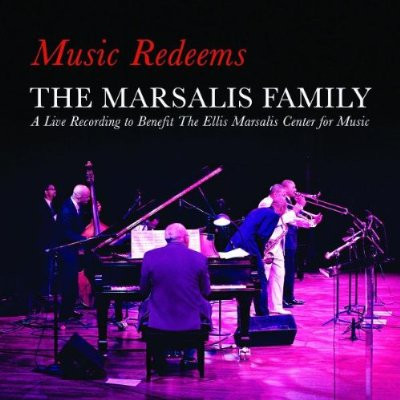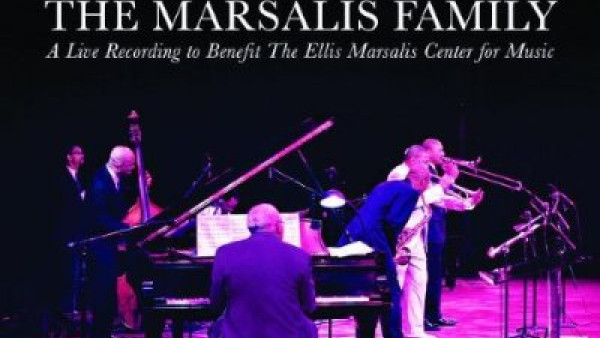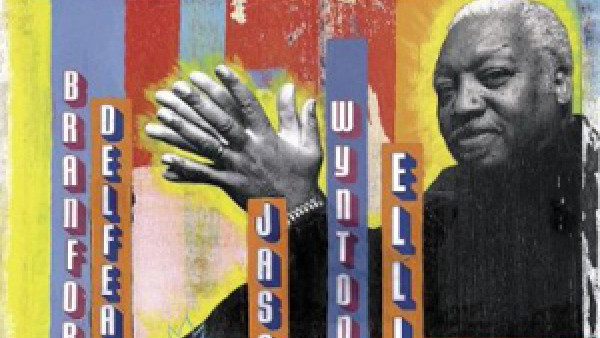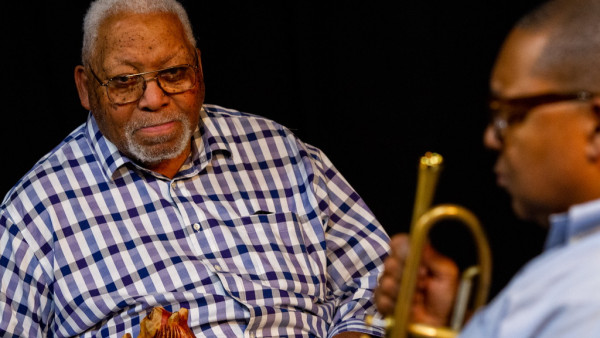Interview: Ellis and Wynton Marsalis
Ellis Marsalis, Jr. — the paterfamilias of the jazz-playing Marsalis clan — says he was “never big on family bands.” Maybe that’s why even after the Marsalis family performed together for the first time during a retirement celebration for Ellis in 2001, they still don’t play as a family all that often. The sole date on their online schedule is their Clowes Hall show. And then they’ll go their separate ways: Wynton with his Jazz at Lincoln Center Orchestra; Ellis, Branford and Jason with their respective quartets; Delfeayo with the Uptown Jazz Orchestra; spoken word artist Ellis III to wherever it is that he issues his oracular judgments on American life (Wynton will have more on that in a minute).
In short, all the Marsalises lead busy professional and personal lives, so it’s only when Ellis is “interested in doing it,” according to Wynton, that they get together for another show. “He’s at the stage now of his life where we try to get together and touch base with him,” he adds. I talked with both Ellis and Wynton this week: Ellis from New Orleans; Wynton from somewhere on the road between San Francisco and Ames, Iowa (he prefers not to fly when he has a choice). The results are as follow, but a quick bio seems in order:
Born in New Orleans in 1934, Ellis Marsalis, Jr. came up as jazz pianist, playing in a modern style that wasn’t obviously indebted to Dixieland and R&B, before moving into education, eventually teaching on both a high school and university level, notably at the New Orleans Center for Creative Arts. He and his wife, Delores, have six sons, five of whom will perform at Clowes. There’s Branford, an adventurous saxophonist who’s worked with Art Blakey, Sting and the Grateful Dead and briefly served as musical director for The Tonight Show. Wynton, a nine-time Grammy winner, long-time artistic head of Jazz at Lincoln Center and notorious contrarian. Ellis, who contributes spoken word monologues to some Marsalis Family gigs. Trombonist Delfeayo, who has followed directly in his dad’s path in becoming a New Orleans-based educator. And drummer Jason, the youngest Marsalis, who has spent more time performing with his dad than any other son.
Feel free to consult Wikipedia or, hell, the Grove Dictionary of Music for more information; for now, to the interviews!
Wynton Marsalis
NUVO: So, who calls the shots at a Marsalis Family show? Your dad?
Wynton Marsalis: Yeah, we go along with him, whatever he wants. He sacrificed for us so much, we have so much respect for him that it’s not a problem.
NUVO: Is there any different sort of chemistry when playing with your family vs. playing with other talented musicians?
Wynton: We all grew up listening to our father’s music. But for Branford and I, it’s different because we grew up playing together. We didn’t play with Delfeayo so much because he’s younger than us. And Jason was two when I left home. He’s such a talented musician, with his hearing and the understanding of the concepts of what we play. He grew up playing with my father, so I’m sure there’s a chemistry between them.
Jason was at a much higher level at a much younger age than we were. In high school, Branford and I played in funk bands, played more popular music, and we would sit in with our father every now and then, but we weren’t really qualified; he would just let us play. Whereas Jason at 13 or 14, he really could play; he could play a gig.
NUVO: But you were playing classical with a symphony at the time…
Marsalis: It’s much easier to play your a Haydn concerto than to play your own solo on the charts my father was playing.
NUVO: Was there much sibling rivalry growing up?
Wynton: Not for me. We played different instruments, and I was always practicing, working hard; it didn’t really make a difference to me. When we became younger men, then we had more of it than we had before. It’s a natural part of families. But we don’t have that at this age, of course. Once you have grown kids, you mature faster. If you’re still dealing with that as a grown man, a middle-aged man, you need to see a therapist.
NUVO: Do you ever bounce ideas or music off of any of your family members?
Wynton: I talk with my father all the time about music and ideas — and with my other little brother who’s not playing music. His name is Ellis; we call him The Oracle because he knows everything. He’s probably the only person in America who’s read the Obamacare health bill. When he gives you information, you can go to the bank with it.
NUVO: What have you taken from your dad, in terms of teaching, music, anything else?
Wynton: Everything. I had the good fortune to grow up watching him. And it was a struggle growing up; a struggle to feed us, to work everything out; when he was playing music, he played many times for very few people. The whole foundation of everything I know about came from him. He was a guy who always practiced and worked, was very serious about the music. It’s been my honor to acknowledge that it was my good fortune to grow up in a family that had him at the head of it.
NUVO: How would you describe his approach to composition?
Wynton: A song like “The Garden” is a combination of downhome, New Orleans-style music with the sophistication of modern jazz. It was unusual; both him and James Black had this kind of intellectualism combined with the downhome quality of our music.
NUVO: When you talk about your dad combining jazz with high art, that sounds kind of like what you do in your own work.
Wynton: Everything I write comes from him and James Black — and musicians I heard when I was growing up. All the time I was going to their gigs. When I was two and three years old, I was in the clubs and listening to them. And I liked them as people; they were colorful, smart, struggling with the culture the way it was, that was in the 1960s. I identified with them. I come from them.
I’ve never bought into a generation gap or trying to divorce myself from my elders and all of that. I’m not a believer in that; I’m the first in a generation that doesn’t believe in that. I try to develop on what they did and look at it like a continuum. I consider that they’ve given me a great inheritance. And it’s the same way in your family and the families of all of the people who will read this. That’s a way of life. We all come from families that all have degrees of dysfunction, but we all have great wisdom in our families.
NUVO: Why didn’t anyone in the family take up bass?
Wynton: Laughs. We needed a bass player. My father played bass, too. My brother, The Oracle, was a guitar player, but he didn’t want to play and he stopped.
NUVO: And I’ve heard that everyone played a different instrument to avoid competition.
Wynton: You heard that right, but we weren’t forced to play. If you didn’t want to play an instrument, you didn’t have to. That’s why my brother, Ellis, doesn’t play.
NUVO: You have a certain reputation for speaking your mind about jazz and American culture.
Wynton: I had a point of view and I expressed it. As you get to a certain age, you get tired of repeating the same thing over and over again. It’s not because you’re burned by it; to be honest with you, I enjoyed the fact that they got mad. The general opinions I had such disagreement with, which were of such disservice to the general populace — they were so misinformed that I actually enjoyed it.
At this point I’m older. I’m in another phase of my life. I don’t have time to spend going back and forth with people who’ve studied the music very little. I leave it to younger guys to do that, and I try to be part of education and part of defining the direction music goes in. But I enjoyed that repartee I had with the cultural cognoscenti, or whatever they go by now. I actually miss those days because things have fallen to such a level in terms of education that I don’t even know if people have that these days. But I haven’t followed it; I hope it still goes on, but I don’t see a lot of it.
NUVO: Would you like to play more often as a family?
Ellis Marsalis: I was never big on family bands. Even when I was teaching, people would ask about that, and I would say everybody needs to do their own thing. Most of the family groups that I saw from a distance in the media, it was always like cats and dogs fighting over some money. I just never did really want a family band, per se.
NUVO: Wynton said you thought they were kind of corny.
Ellis: I don’t know if I thought that it was corny. It begins to be rather tricky if you’re going to do it from a business standpoint. I had an interview one time with Wynton and I. We were in Japan, and the reporter asked, ‘Why aren’t you in Wynton’s band?’ I said, first of all, if I was in Wynton’s band, the music would be dated, because at that time, Wynton was still a growing musician, and he needed everyone to be on the same page musically with him. There were other factors involved; I was still teaching school. The freedom to move about wasn’t quite the same.
NUVO: Or your students were like your family, as Wynton suggested.
Ellis: That’s a good way to look at that, but not all of the students that I taught decided to deal with music at the same level. When I was teaching at the New Orleans Center for Creative Arts, which is at the high school level, the most important thing was to help students make a decision about what they wanted to do in relationship with music. Once you get to the university level, the priorities are different. Once you get there, they’re either already good players who decided they want to get a degree; or they decided they’re not going to try and be a professional every day and want to get some educational credits to back them up. Either way was fine with me.
NUVO: So as a teacher and a father, you didn’t force anyone down a particular path.
Ellis: We had a great faculty. It was three of us, and what we tried to do was to get the students to be aware of what was possible out there. First of all, jazz does not speak to everybody. A son of a distant cousin of mine came to NOCCA to play jazz, but it didn’t speak to him. So he eventually went straight to classical music, and has a big group now called Rodney Mack Philadelphia Big Brass. There were at least one or two people who were really marvelous pianists — and one of them is a banker, and another is a lawyer. We had a motto among us at the faculty: If a student completed our program and decided not to go into music at all, that’s fine; but if they completed our program, decided to go into music and weren’t able to function, either at a conservatory or some other situation, then we have failed as teachers.
NUVO: Guys like David Baker at IU fought for acceptance of jazz in the academy, saying that it was equal in complexity to classical music, worthy of study for young people. Did you face some of the same kind of challenges when you started teaching?
Ellis: I haven’t really thought a lot about it. Some things I discovered vicariously. Chairmans of departments started to realize that if they had a jazz studies program they could get more students into the music department when it came time for budgets. In a lot of cases, it wasn’t about how good the program was; most of those universities, if they had a music department at all, their department was essentially based on a proliferation of European art music, and it had a long history of that. And jazz music had not yet been codified in a way which made it compatible with what else was going on.
If you notice today, most of the young players coming out, the top-end players, are all coming out of conservatories, they’re all versed in classical music, and they just chose to go in that direction. Pianists like Danilo Perez. I just saw a kid two nights ago, working with Paquito D’Rivera, and the last thing he played was a Bach fugue. Even some of the older ones: Chick Corea was at Juilliard back in the day; he and Hubert Laws would talk about when they were together at Juilliard. It’s a slow process in terms of how these things come along and how they’re accepted. I don’t know that there’s a wide range of acceptance now, anyway.
NUVO: And then there’s that argument that something was lost when people started learning jazz in school instead of in clubs.
Ellis: It’s an ‘either way’ situation. I learned a lot from individuals in clubs, and in some cases the club was the only case to really perform what you were interested in. If you were listening to somebody like Oscar Peterson or Horace Silver, if you were going to play that you had to be in a situation where there was rhythm section. There’s some passages in Milt Hinton’s book Bass Line where he talks about when he and Dizzy were in Cab Calloway’s band. During breaks, they’d go on the road of some space they were playing and Dizzy would show him things to do as a bass player in this new music that was eventually called bebop. There was never any one particular way to learn whatever it is that you needed to learn. I don’t think the school is yet the sole way to do that because the curiculuum is not set up for jazz studies in a complete sense.
NUVO: Wynton described your music as being a cross between art music and New Orleans traditional music, more or less. Does that ring true?
Ellis: I think it depends on what I’m writing and what I’m trying to do. A lot of things that I wrote early on were designed to maximize opportunities to solo, whether me or a particular band I put together. And there were some pieces I wrote that were jazz-influenced, but were what was called “through-composed,” where you have to play it; there’s no improvisational aspect to it.
NUVO: How about the New Orleans side of things. Do you try to pay tribute to or reflect New Orleans musical traditions in your music?
Ellis: The quality of your music is going to be reflected in the nature of the culture that you come out of. If you go back and listen to a lot of European music, at various points you can hear that there’s a very militaristic aspect to what is taking place. That had a lot to do with the culture that they came out of. Every now and then I’ll think about how in those pieces, at points you get that [more or less sings “The Imperial March” from Star Wars], that kind of thing. There was no real separation from that until you get to the French music.
by Scott Shoger
Source: NUVO Indy’s Alternative Voice




